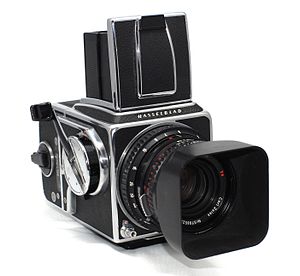
Back Kamera Afrikaans Sīensearu ANG آلة تصوير Arabic كاميرا ARY دوربین AZB Kamera BAR Tustèl BEW Фотокамера Bulgarian कैमरा Bihari ক্যামেরা Bengali/Bangla


A camera is an instrument used to capture and store images and videos, either digitally via an electronic image sensor, or chemically via a light-sensitive material such as photographic film. As a pivotal technology in the fields of photography and videography, cameras have played a significant role in the progression of visual arts, media, entertainment, surveillance, and scientific research. The invention of the camera dates back to the 19th century and has since evolved with advancements in technology, leading to a vast array of types and models in the 21st century.
Cameras function through a combination of multiple mechanical components and principles. These include exposure control, which regulates the amount of light reaching the sensor or film; the lens, which focuses the light; the viewfinder, which allows the user to preview the scene; and the film or sensor, which captures the image.
Several types of cameras exist, each suited to specific uses and offering unique capabilities. Single-lens reflex (SLR) cameras provide real-time, exact imaging through the lens. Large-format and medium-format cameras offer higher image resolution and are often used in professional and artistic photography. Compact cameras, known for their portability and simplicity, are popular in consumer photography. Rangefinder cameras, with separate viewing and imaging systems, were historically widely used in photojournalism. Motion picture cameras are specialized for filming cinematic content, while digital cameras, which became prevalent in the late 20th and early 21st century, use electronic sensors to capture and store images.
The rapid development of smartphone camera technology in the 21st century has blurred the lines between dedicated cameras and multifunctional devices, profoundly influencing how society creates, shares, and consumes visual content.